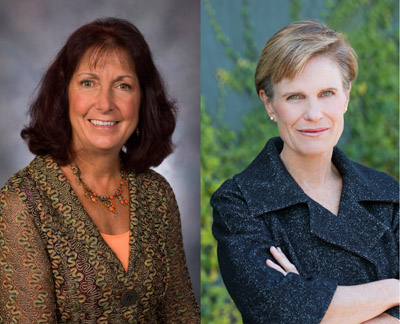New Social Decision Analytics Laboratory to bring high level statistical and data science capability

Sallie A. Keller, a nationally recognized researcher in statistical and data sciences, and Stephanie Shipp, a senior researcher in the area of economic and policy analysis, will come to Virginia Tech and establish the Social Decision Analytics Laboratory at the Virginia Tech Research Center--Arlington in the National Capital Region.
Keller will head the new laboratory which will bring world class statistical and data science capability to a Virginia Bioinformatics Institute initiative in "information biology" – the broad-based study of massively interacting systems ranging from molecular to social phenomena.
The laboratory will establish a new statistical data sciences wing of the institute's Advanced Computing Informatics Laboratories research division. Together, the computational data science capabilities of the Network Dynamics and Simulation Science Laboratory and Keller’s new "big data"– oriented laboratory are a critical and world-leading information synthesis presence at the institute.
"The amount of information available at any given moment in the modern world is overwhelming," said Keller. "Every global challenge we face today is rooted in information. How do we deal with the modern-day onslaught of information? How can we help make cities where 50 percent of the world’s population now lives smarter?"
The Social Decision Analytics Laboratory will discover new ways to harness advances in "big data" analysis for social policy questions, among others.
"Sallie Keller and Stephanie Shipp bring a leading edge statistical data sciences approach that bookends the advanced computational team and approach of the Network Dynamics and Simulation Science Laboratory," said Virginia Bioinformatics Institute Scientific Director Chris Barrett. "A unique, timely, and urgently needed integrative program for big data-oriented analytics will being created.
"In addition to her impressive personal research achievements, Keller is well known for multidisciplinary team building. Since there are no big problems that reside cleanly inside single academic disciplines, her passion for working outside disciplinary boundaries will fit perfectly in the institute's team science, big question approach," said Barrett.
"These hires and their emerging analytics group fit perfectly into the strategic research vision we are calling 'information biology'," said Dennis Dean, director of the Virginia Bioinformatics Institute. "This group provides a terrific complement to our existing strengths and goes a long way toward realizing the ambitious goals we have for the institute."
Keller established the statistical sciences group at Los Alamos National Laboratory, led the School of Engineering at Rice University, and served as director of the Institute for Defense Analysis Science and Policy Institute before coming to Virginia Tech
She is a fellow of the American Association for the Advancement of Science and a fellow and past president of the American Statistical Association. Keller received her bachelor's degree and her master's degree from the University of South Florida and a doctoral degree from Iowa State University.
Shipp was the director of the Economic Assessment Office, Advanced Technology Program, National Institute of Standards and Technology; the assistant division chief at the Census Bureau, and has held other leadership positions at the Bureau of Labor Statistics
She is a fellow of the American Statistical Association. Shipp received her bachelor's degree from Trinity College (Washington, D.C.) and a doctoral degree from George Washington University.
Dedicated to its motto, Ut Prosim (That I May Serve), Virginia Tech takes a hands-on, engaging approach to education, preparing scholars to be leaders in their fields and communities. As the commonwealth’s most comprehensive university and its leading research institution, Virginia Tech offers 240 undergraduate and graduate degree programs to more than 31,000 students and manages a research portfolio of $513 million. The university fulfills its land-grant mission of transforming knowledge to practice through technological leadership and by fueling economic growth and job creation locally, regionally, and across Virginia.








